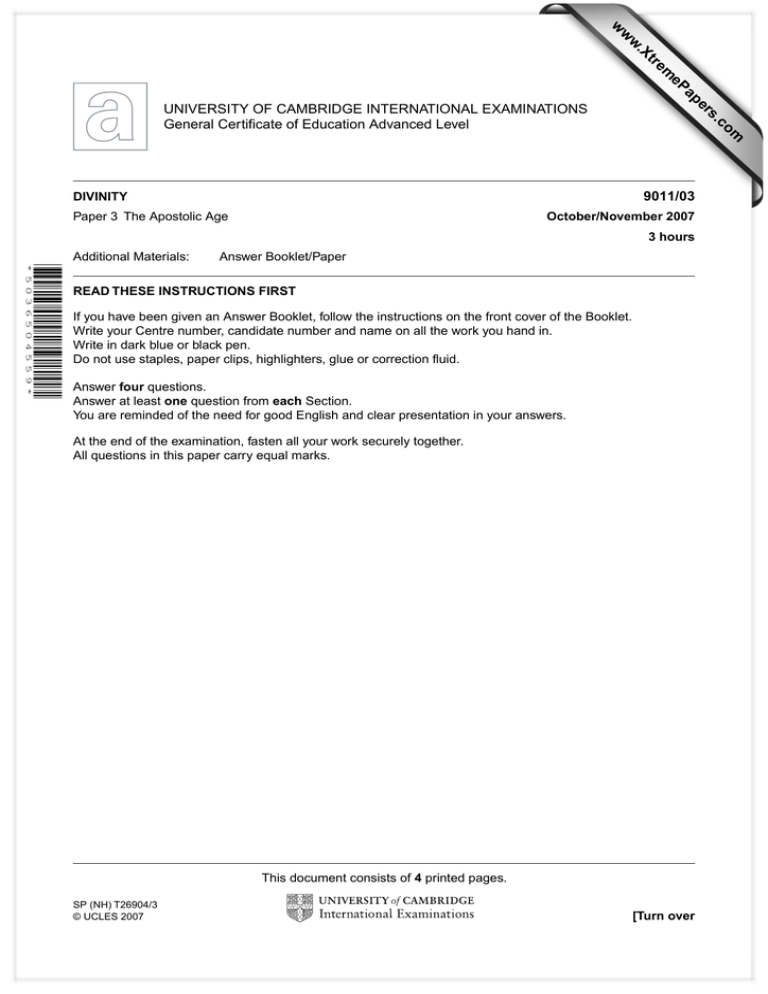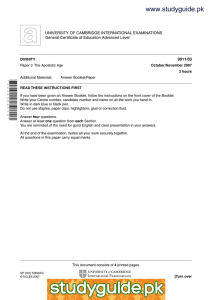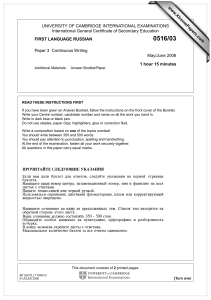
w
w
ap
eP
m
e
tr
.X
w
om
.c
s
er
UNIVERSITY OF CAMBRIDGE INTERNATIONAL EXAMINATIONS
General Certificate of Education Advanced Level
9011/03
DIVINITY
Paper 3 The Apostolic Age
October/November 2007
3 hours
Additional Materials:
Answer Booklet/Paper
*5036504559*
READ THESE INSTRUCTIONS FIRST
If you have been given an Answer Booklet, follow the instructions on the front cover of the Booklet.
Write your Centre number, candidate number and name on all the work you hand in.
Write in dark blue or black pen.
Do not use staples, paper clips, highlighters, glue or correction fluid.
Answer four questions.
Answer at least one question from each Section.
You are reminded of the need for good English and clear presentation in your answers.
At the end of the examination, fasten all your work securely together.
All questions in this paper carry equal marks.
This document consists of 4 printed pages.
SP (NH) T26904/3
© UCLES 2007
[Turn over
2
Section A
Answer at least one question from this section.
If you choose question 1, answer in one version only.
Acts 1–21:15 and Galatians
REVISED STANDARD VERSION
1
Comment on points of interest or difficulty in four of the following, with brief reference to the
general context:
(a) After him Judas the Galilean arose in the days of the census and drew away some of the
people after him; he also perished, and all who followed him were scattered. So in the present
case I tell you, keep away from these men and let them alone.
(Acts 5:37–38a)
(b) Men, why are you doing this? We also are men, of like nature with you, and bring you good
news, that you should turn from these vain things to a living God who made the heaven and
the earth and the sea and all that is in them.
(Acts 14:15)
(c) And he said to them, “Did you receive the Holy Spirit when you believed?” And they said, “No,
we have never even heard that there is a Holy Spirit.” And he [Paul] said, “Into what then were
you baptized?”
(Acts 19:2–3a)
(d) For I would have you know, brethren, that the gospel which was preached by me is not man’s
gospel. For I did not receive it from man, nor was I taught it …
(Galatians 1:11–12a)
(e) Now we, brethren, like Isaac, are children of promise. But as at that time he who was born
according to the flesh persecuted him who was born according to the Spirit, so it is now.
(Galatians 4:28–29)
(f)
For you were called to freedom, brethren; only do not use your freedom as an opportunity
for the flesh, but through love be servants of one another. For the whole law is fulfilled in one
word …
(Galatians 5:13–14a)
© UCLES 2007
9011/03/O/N/07
3
NEW INTERNATIONAL VERSION
1
Comment on points of interest or difficulty in four of the following, with brief reference to the
general context:
(a) After him, Judas the Galilean appeared in the days of the census and led a band of people in
revolt. He too was killed, and all his followers were scattered. Therefore, in the present case I
advise you: Leave these men alone!
(Acts 5:37–38a)
(b) Men, why are you doing this? We too are only men, human like you. We are bringing you good
news, telling you to turn from these worthless things to the living God, who made heaven and
earth and sea and everything in them.
(Acts 14:15)
(c) And [he] asked them, “Did you receive the Holy Spirit when you believed?” They answered,
“No, we have not even heard that there is a Holy Spirit.” So Paul asked, “Then what baptism
did you receive?”
(Acts 19:2–3a)
(d) I want you to know, brothers, that the gospel I preached is not something that man made up. I
did not receive it from any man, nor was I taught it …
(Galatians 1:11–12a)
(e) Now you, brothers, like Isaac, are children of promise. At that time the son born in the ordinary
way persecuted the son born by the power of the Spirit. It is the same now.
(Galatians 4:28–29)
(f)
You, my brothers, were called to be free. But do not use your freedom to indulge the
sinful nature; rather, serve one another in love. The entire law is summed up in a single
command …
(Galatians 5:13–14a)
2
Why was the Council of Jerusalem held, and what decisions did it reach? How difficult is it to
reconcile the account of the Council in Acts with the evidence of Paul’s letters?
3
Discuss the role and the importance of the Holy Spirit in the life of the Church and of the individual
Christian as portrayed in Acts.
4
When and why was Galatians written?
© UCLES 2007
9011/03/O/N/07
[Turn over
4
Section B
Answer at least one question from this section.
5
Assess the role and importance of Peter in the development of the teaching and mission of the
early Church.
6
How did Paul’s conversion experience shape his faith and theology?
7
‘For both Paul and the author of Hebrews, Abraham was a figure of greater significance than
Moses.’ Discuss.
8
Explain Paul’s teaching in 1 Corinthians on the Church as ‘the body of Christ’, and the reasons
which led him to give this teaching.
9
What, according to the Epistle of James, is the essence of true Christianity? Comment briefly on
the circumstances which may have led the author to give this teaching.
10 What may be learned from Acts and the epistles you have studied for this paper concerning the
organisation of the early Church and the development of its worship?
Copyright Acknowledgements:
Scripture quotations marked (RSV) are from the Revised Standard Version of the Bible, copyright © 1946, 1952 and 1971 by the Division of Christian Education
of the National Council of the Churches of Christ in the USA. Used by permission. All rights reserved.
Scripture quotations marked (NIV) are taken from the Holy Bible, New International Version®. NIV®. Copyright © 1973, 1978, 1984 by International Bible Society.
Used by permission. All rights reserved.
Permission to reproduce items where third-party owned material protected by copyright is included has been sought and cleared where possible. Every reasonable
effort has been made by the publisher (UCLES) to trace copyright holders, but if any items requiring clearance have unwittingly been included, the publisher will
be pleased to make amends at the earliest possible opportunity.
University of Cambridge International Examinations is part of the Cambridge Assessment Group. Cambridge Assessment is the brand name of University of
Cambridge Local Examinations Syndicate (UCLES), which is itself a department of the University of Cambridge.
© UCLES 2007
9011/03/O/N/07










